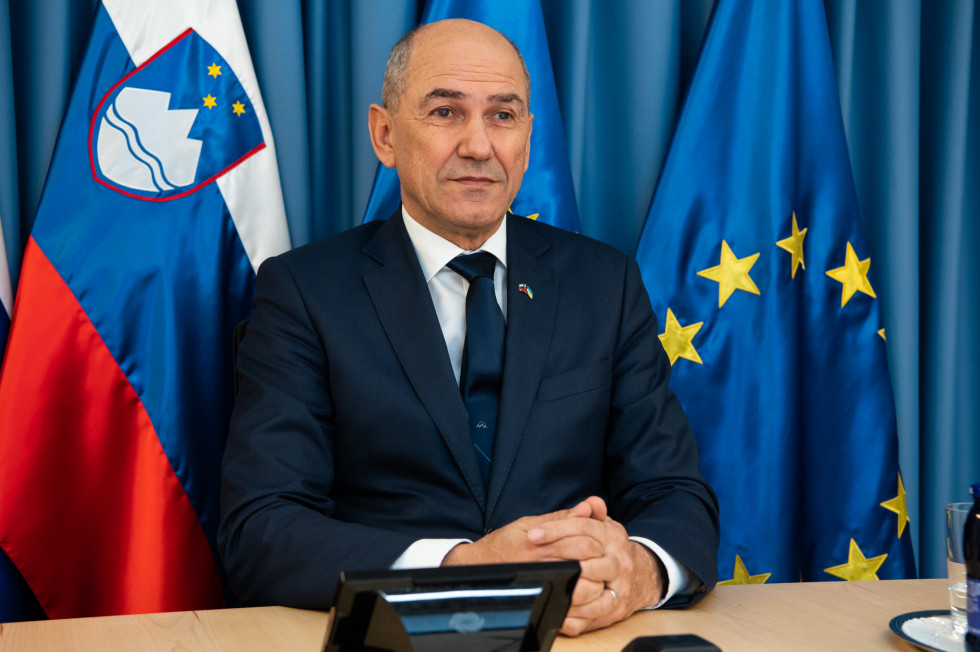By: UKOM
On Wednesday, 30 March 2022, Prime Minister Janša was a guest on “Connect the World” on CNN International, talking to host Becky Anderson about the current situation in Ukraine.
Prime Minister Janša first spoke about his recent visit to Ukraine, where he met with the Ukrainian leadership. “In our talks, President Zelenskyy seemed determined and ready to fight,” said the Prime Minister, adding that he believed Ukraine would win this war. “People are dying every day, so we must do everything in our power to support them and help them to defend themselves,” said the Prime Minister.
“When we spoke with the Ukrainian leadership, they also told us that, after everything that has happened, they are prepared to change the constitution and propose a referendum to the Ukrainian people, giving up their aspiration to enter NATO, which is written in their constitution, but at the same time, they want institutional guarantees for their security, which they see in full EU membership,” said the Prime Minister. He went on to say that the Ukrainians now want even more significant guarantees than those given in the 1994 Budapest Memorandum.
According to the Prime Minister, Ukraine realised that they need NATO and the guarantees from Article 5, but why insist on this goal that is currently not doing them any good; they therefore made the pragmatic decision not to insist on it. “Once they win the war, NATO will probably want to invite them in. “When they win, the Ukrainian army will undoubtedly be one of the strongest in Europe,” said the Prime Minister, adding that the ball was now in Europe’s court, and that Europe had to ensure a quick path to EU membership. “And Ukraine must be supported with as much military power as possible, because this is the only thing that makes it possible to stop the war,” said the Prime Minister.
On the topic of military weapons, the Prime Minister said that he was in favour of delivering air defence equipment to the Ukrainians, because that was what Ukraine needed the most right now, with Russia dominating the sky. “I am not in favour of merely talking about this type of help, but I am strongly in favour of actions,” said the Prime Minister. He went on to say that, at the moment, there were countries that helped Ukraine but did not talk about it, and countries that talked about help but did not provide it, and countries that were more resistant to doing anything. As regards countries that help but do not talk about it publicly, the Prime Minister did not wish to be any more specific, but he said that some countries were helping but denied it publicly for a variety of reasons.
“Our unity within the EU is greater than expected, and especially greater than the Kremlin expected. Russian aggression caught us off guard. But taking everything that we’re doing into consideration, I think it’s still not enough. I strongly support President Zelenskyy’s requests when he said ‘please, friends, give us 1% of your defence reserves, and we will be able to defend ourselves alone’. Some countries give as much, some give less, but not all of them are giving something,” said the Prime Minister.
When asked about Slovenia’s dependence on Russian natural gas and oil, the Prime Minister responded that spring was around the corner and that “we are doing everything we can to end this dependence on Russia by the end of the year. We are in talks with our neighbouring countries and other countries so that we can obtain alternative sources and sources of reserves, and we will also be building new capacities. A few days ago, I visited Croatia, where we discussed how we could be part of the LNG terminal so that we could bring such reserves to Slovenia and other Central European countries,” said the Prime Minister. He expressed his belief that independence from Russian energy products would come sooner than the Kremlin expected.
“Right now, we are faced with the sad reality that, by paying for natural gas, oil and coal, we are actually financing aggression or war,” said the Prime Minister. He added that no one in Europe was prepared to pay Russia for its energy products in rubles, as “this is also in contravention of the signed contracts. The message from our ministers and the G7 ministers was clear, which is that no one will be paying in rubles. In fact, we don’t even know what rubles look like,” concluded Prime Minister Janša.
Source: gov.si

